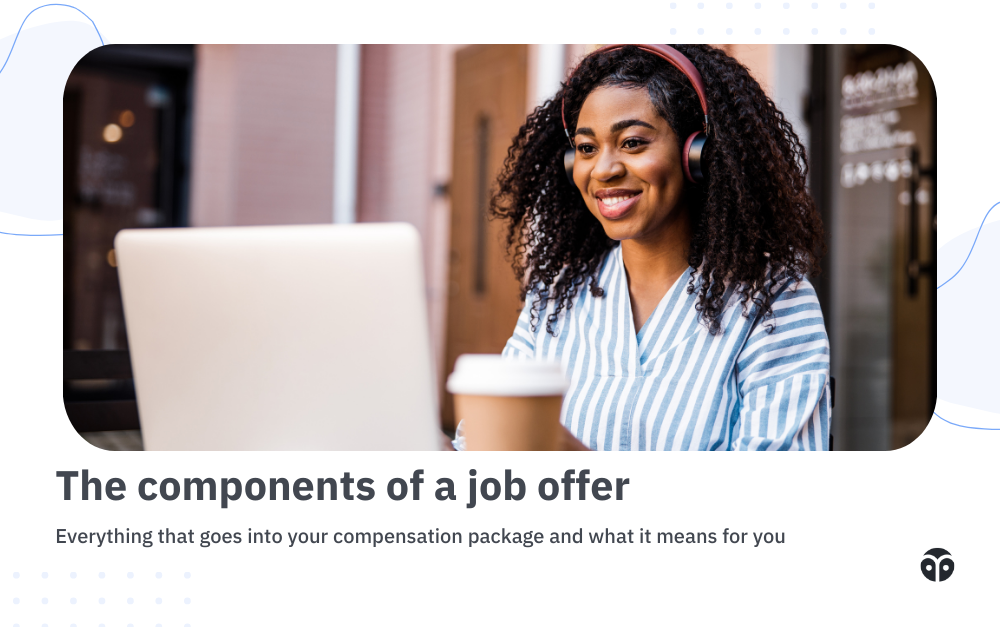Understanding the components of a job offer
An overview of everything that goes into your compensation package and what it means for negotiations during the job hunt.

The base salary is just one part of your overall compensation. By understanding all components, such as bonuses, health benefits, retirement plans, and additional perks, you can get a full picture of your total compensation. This helps you assess the true value of the offer and compare it effectively with other opportunities.
Being informed about all aspects of your job offer gives you the tools you need to negotiate effectively. You can discuss specific components that are important to you, like requesting a higher base salary, more PTO, or better bonuses, to ensure the offer meets your specific needs and expectations.
Here’s everything to consider as part of your total compensation package.
Core financial compensation
This part of compensation is what people are most familiar with. It typically includes the base salary, bonuses, and stock options or equity.
Base Salary
The base salary represents the fixed amount of money you will receive annually or hourly before any additional benefits or bonuses are included. This figure is usually quoted as an annual salary (such as $60,000 per year) or an hourly wage (such as $30 per hour). When considering a job offer, the base salary is crucial because it forms the core of your total earnings. Factors that can affect the base salary include your level of experience, educational background, the specific industry, and the geographic location of the job.
Bonuses
Bonuses are extra payments you can earn based on various performance metrics or company results. They come in different forms:
- Performance Bonuses: These are linked to your individual performance. If you achieve or surpass your targets, you may receive a performance bonus at the end of a specific period, such as a quarter or year.
- Annual Bonuses: These are typically based on the company's overall performance and are paid out once a year.
- Sign-on Bonuses: Some companies offer one-time bonuses when you accept a job offer to attract top talent.
Bonuses can significantly enhance your overall compensation, making it important to understand how they are structured and what criteria must be met to earn them.
Stock Options and Equity
Stock options and equity provide an opportunity to become a partial owner of the company. Stock options grant you the right to purchase company shares at a predetermined price, often lower than the market value, after a certain period. Equity might be given as shares that you own immediately or that vest over time.
Stock Options:
- Incentive Stock Options (ISOs): Often offered to employees, these options provide tax benefits if certain conditions are met, like holding the stock for a specified period.
- Non-Qualified Stock Options (NSOs): Available to employees, directors, contractors, and others, these options do not qualify for special tax treatments like ISOs.
Equity:
- Restricted Stock Units (RSUs): These are company shares given to employees as part of their compensation, which vest over time or upon meeting certain milestones.
- Employee Stock Purchase Plans (ESPPs): These plans allow employees to purchase company stock at a discounted price, usually through payroll deductions over a set period.
- Performance Shares: These are shares granted based on the company's performance metrics, often tied to specific goals or financial targets.
Retirement Plans
Retirement plans are essential for building a secure financial future. Employers often offer various types of retirement savings options, including:
- 401(k) Plans: A popular retirement savings plan where employees can contribute a portion of their salary, often with employer-matching contributions. Understanding the matching formula and vesting schedule is crucial.
- Pension Plans: A traditional retirement plan that provides a fixed payout upon retirement, based on salary and years of service. Although less common today, some employers still offer them.
- Roth 401(k) Plans: Similar to a 401(k), but contributions are made with after-tax dollars, allowing for tax-free withdrawals in retirement.
Health and wellness benefits
Health and wellness benefits go beyond your paycheck, providing valuable support for medical expenses, mental health, and overall quality of life. In some ways, they’re just as critical to consider as the base salary. There’s a wide range of benefits that fall under this category, so it’s important to get all the details when considering an offer. What’s important to you may not be important to someone else, so when reviewing offers, consider the specific needs you and your family may have and how health and wellness benefits may impact your finances or overall quality of life.
Health insurance
Health insurance is a critical benefit that helps cover the cost of medical care. Most employers offer health insurance plans that include medical, dental, and vision coverage. It’s important to understand the specifics of each plan, including:
- Medical Insurance: Covers hospital visits, doctor appointments, prescription medications, and preventive care. Look at the premium costs, co-pays, deductibles, and provider network.
- Dental Insurance: Helps cover the cost of dental care, including cleanings, fillings, and sometimes orthodontics. Check for coverage limits and network dentists.
- Vision Insurance: Provides coverage for eye exams, glasses, and contact lenses. Review the specifics of what is covered and any out-of-pocket costs.
Understanding the details of health insurance plans can help you estimate your out-of-pocket expenses and choose the best option for your needs.
Wellness programs
Wellness programs are initiatives designed to promote healthy lifestyles and improve physical and mental health. These programs can include a variety of resources and incentives:
- Fitness Programs: Provide access to gym memberships, fitness classes, or on-site fitness facilities. Some companies offer subsidies or reimbursements for fitness-related expenses.
- Mental Health Support: Give resources like counseling services, mental health hotlines, and stress management workshops. Employee Assistance Programs (EAPs) often provide confidential counseling and support services.
- Health Screenings and Preventive Care: Programs that encourage regular health screenings, vaccinations, and preventive care to catch potential health issues early.
Participating in wellness programs can lead to better health outcomes and, over time, lower healthcare costs.
Parental Leave
Parental leave policies provide time off for new parents to care for and bond with their newborn or newly adopted child. The length and pay of parental leave can vary widely, so it’s important to review your employer’s specific policy. Some companies offer additional benefits like leave planning coaching, return-to-work wellness packages, or telehealth services for new parents.
Life and disability insurance
Life and disability insurance provides financial security for you and your family in the event of serious illness, injury, or death. These insurance options typically include:
- Life Insurance: Provides a financial payout to your beneficiaries in the event of your death. Review the coverage amount and any optional supplemental life insurance available.
- Short-Term Disability Insurance: Replaces a portion of your income if you are temporarily unable to work due to illness or injury. Check the coverage percentage and the duration of benefits.
- Long-Term Disability Insurance: Provides income replacement if you are unable to work for an extended period due to a serious health condition. Understand the terms, coverage limits, and waiting periods.
Paid Time Off (PTO)
PTO allows employees to take time off from work while still receiving their regular pay. PTO typically includes vacation days, sick days, and personal leave. Take the time to understand the PTO policy, including how days are accrued and any restrictions on usage. Some companies offer unlimited PTO, which can be great if the culture is supportive.
Flexible Work Arrangements
Flexible work arrangements allow employees to adjust their work schedules or locations to better balance their professional and personal lives.
Common types of flexible work arrangements include:
- Remote Work: The option to work from home or another location outside the traditional office. This can be full-time or part-time.
- Flexible Hours: The ability to adjust your start and end times to fit your personal schedule, as long as you meet your required hours and job responsibilities.
- Compressed Workweeks: Working longer hours on fewer days, such as four 10-hour days instead of five 8-hour days.
Research shows that many employees highly value flexible work arrangements. These arrangements can be beneficial for caregivers who need flexibility in their schedules to navigate the demands of caregiving or for individuals who want more control over their time.
Financial and professional growth
Beyond immediate compensation, a job offer can include benefits that support your long-term financial security and professional development. These elements help you grow your skills, plan for the future, and enhance your career trajectory.
Professional Development
Professional development benefits help you acquire new skills and advance your career. Employers may support your growth through various programs and incentives, such as:
- Training Programs: Opportunities to attend workshops, seminars, and conferences to enhance your skills and knowledge.
- Certifications: Financial support for obtaining industry-recognized certifications that can boost your expertise and career prospects.
- Tuition Reimbursement: Reimbursement for further education, such as degree programs or specialized courses related to your field.
Find out if you get a yearly stipend for growth and development or what the approval process is to be reimbursed for learning opportunities, conferences, networking events, or more.
Get holistic job hunt support with Formation
The Formation Fellowship gives mid-level and senior engineering job seekers everything they need to land their dream roles—including personalized skill brush-ups, unlimited mock interviews with experienced software engineers and hiring managers from top-tier tech companies, and offer reviews and negotiation support.
Apply here for unconditional support from a team of engineering mentors, technical recruiters, career coaches, and more.



